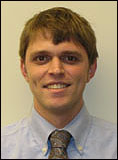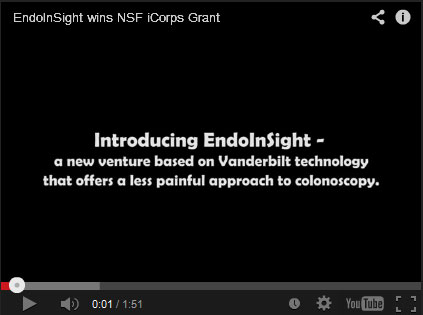
For Byron Smith, his engineering graduate research was personal. After losing his father to cancer, he was eager to explore ways to make colonoscopy less dreaded and increase the number of people who get screened for colorectal cancer each year.
His dedication has led to a new venture – EndoInSight – and a National Science Foundation Innovation Corps Program grant.
As his collaborator and former professor Pietro Valdastri points out, early screening is the key to saving lives. And, early screening that is less painful and less fearful for the patient is a simple solution.
“Colon cancer is typically asymptomatic in the early stages,” said Valdastri, assistant professor of mechanical engineering. “Once a patient feels pain, it has most often already metastasized and survival rate is about 5 percent. If we can catch it early, before the cancer spreads, a patient’s chance for survival increases to 95 percent.”

One way to reduce discomfort associated with the screening procedure is already widely known in the medical world and is being used in some offices. It is to use carbon dioxide — CO2 — instead of air to inflate the colon during colonoscopy. CO2 is absorbed 150 times faster by the body and, according to the engineers, is “almost painless.”
The problem is, it’s expensive. Until now.
Valdastri and Smith have worked closely with Vanderbilt gastroenterologist Keith Obstein to design a device that can be attached to a standard endoscope in order to administer CO2 during colonoscopy.
“The device uses an acid-based solution to generate an effervescent reaction that produces CO2, essentially the same chemicals found in Alka-Seltzer. As the doctor works his way to the cecum, he uses the attachment for inflation. Once he reaches the cecum, he detaches the tube and uses the tool channel as he normally would,” Smith said.
To bring this new technology to market, Smith formed EndoInSight. The concept behind the company helped the researchers win a spot in the highly selective Innovation Corps Program, a six-month business accelerator led by the National Science Foundation.
With Valdastri serving as academic researcher and CTTC Manager of New Ventures Rigved Joshi serving as business mentor, Smith rounds out the EndoInSight team as entrepreneur. The team will participate in a series of courses and sessions to help build a viable business model. The team will also receive $50,000 as a part of its selection into the I-Corps Program.
Watch YouTube video
